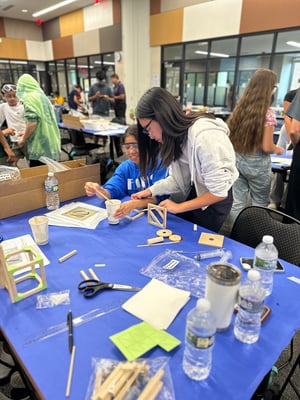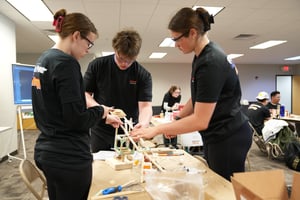
Fluid Power Action Challenge
The Fluid Power Action Challenge is a STEM-based competition that challenges middle school and high school students to solve an engineering problem using fluid power. The students work in teams to design and build a fluid power mechanism and compete against other teams in a timed competition.
Engineering a Successful Future
Benefits:
- Actively engages students in learning about fluid power.
- Gives support and resources to teachers for science and technology curriculum.
- Creates a learning environment where math and science are fun.
- Encourages students to practice teamwork, engineering and problem-solving skills.
- Introduces students to careers in the fluid power industry.
Hundreds of individuals in NFPA member companies and education partner institutions have been involved in mentorship, classroom activities, and events related to the Fluid Power Action Challenge, which have engaged more than 31,000+ students. Contact the Workforce Team at workforce@nfpa.com with any questions.
NFPA provides a program overview, cost calculator, and summary of additional resources to plan your event.
Watch this video to learn more about the Fluid Power Action Challenge.
Find Action Challenge events in your community, obtain Host / Organizer contact information, and identify events seeking NFPA member volunteers or sponsors.
Read MoreGetting Started with the Fluid Power Action Challenge

On Workshop Day, teams learn about the basics of fluid power – what it is, how it works, and how it is used in everyday life. They also get the chance to learn about what careers in the fluid power industry are like, and how they can start pursuing those. Next, teams build basic pneumatic kits and begin developing the skills they’ll be using in the Action Challenge competition. They start working on machines that rotate and lift objects. Workshop Day wraps up by giving the students the Action Challenge problem – what they are actually tasked with doing at the Challenge. Teams are asked to build a machine that can move an object from one location to another, and are given all of the tools and a kit of supplies that they will need. Over the coming weeks, they develop a plan, and start building!

On Challenge Day, the teams come together again to use the same tools and an identical kit of supplies in recreating their unique machine, which they use in the competition to pick up weighted objects and place them on various level platforms. Teams are judged on their portfolio, design, teamwork and total machine points. They can win in any of these areas! As the teams work during the allotted time, Challenge Judges observe the teams and interview students, asking them about how they came up with their design and how they work together as a team. When the time is up, the teams all gather together and put their machines to the test. The judges keep score as teams use their machines, seeing how many objects they can move in the allowed time.
COST ESTIMATOR EXAMPLE
| ITEM | QUANTITY | ESTIMATED COST | ESTIMATED TOTAL |
| NFPA Challenge Event Kit (Workshop + Tool + Challenge Kits) - one per team; excludes shipping and handling | 20 | $230.00 | $4,600.00 |
| Trophies: Event Champion, Competition Board Winner, Best Portfolio, Best Design & Operation, and Top Work Habits | 5 | $50.00 | $250.00 |
| T-shirts for students, educators, and volunteers / judges | 110 | $14.00 | $1,540.00 |
| Medals with ribbons for students | 80 | $5.50 | $440.00 |
| Lunch for students, educators, volunteers / judges | 110 | $10.00 | $1,100.00 |
Resources for Community Wide and In School Events
Workshop Day introduces students to fluid power fundamentals (hydraulics and pneumatics) and the event. Teams then design their machine in the research, planning and prototyping stage. Challenge Day utilizes the teams' skills - problem solving, teamwork, time management, communication, and project management - to compete and solve an engineering problem.
If you're new to organizing or hosting a Fluid Power Action Challenge, this overview and timeline may help.
Resources for Organizers-Hosts, Educators, and Mentors-Volunteers are located in the How It Works, Community Wide and In School Competition sections below.
Start here for an overview of the event Organizer-Host role, responsibilities, and associated timing. Consider including colleagues and stakeholders in the planning and preparation.
- Social Media Policy Form
- Email to Teachers to Announce the Event
- Email to Teachers Once They Sign Up for the Event
- Liability Release Form
- Volunteers Standard of Conduct Form
- Event Invitation
- School Names Signs 11x17
- Sponsor Sign 11x17
- Save the Date
- Promotional Flyer
- Sponsorship Flyer
- Email to Local Companies - Sponsorship
- NFPA Fluid Power Challenge Logo
- NFPA Foundation Logo
- Fluid Power Man Logo
- Finding A Challenge Location
- Student Certificate - Event Recognition
- Sample Press Release-Event Announcement
- Sample Press Release-Post Event
- Team Registration Form
- Photo Video Consent Form - Students
- Sign-Up-Form-for-Schools
Action Challenge kits, competition boards, and related materials can be purchased through the Mechanical Kits website. Customer service can be reached at support@mechanical-kits.com
Community Wide Competition
In a Community-Wide Fluid Power Action Challenge, an educational institution, community organization, or industry sponsor organizes / hosts the event for teams from multiple schools. A unique set of documents has been prepared for this event type.
Community Wide Competition resources (documents, presentations, and learning materials) are found in the corresponding sections below.
To host and run a competition, you will need colleagues or other support to help with the logistical details, recruit schools and organizations to participate, order event kits, promote the event to appropriate stakeholders, order t-shirts and trophies, and/or food for the Workshop and Challenge days.
You will also need help facilitating the event's technical aspects, including introducing students to fluid power concepts, demonstrating the tools, and constructing foundational kit builds (e.g. lifter and rotating platform) on Workshop Day. They would also be responsible for presenting the Challenge problem and layout to the students that the teams will have to solve when they rebuild their device on Challenge Day.
Judges for the events are usually engineers or educators capable of judging portfolios, calculating team scores, and interviewing teams. They tend to have some foundational knowledge of fluid power.
- Notes for Facilitators & Teachers
- FPAC Challenge Rules (1 per Team)
- Action Challenge Scenario (2 per Team)
- Challenge Board CAD Design (ISO)
- Challenge Rubric (2 per Team)
- Judge' Duties
- Judges' Rubric
- Challenge Pre-Survey for Students
- Challenge Post Survey for Students
- Teacher Feedback Survey
- Workshop Day Documents
- Attaching Piston Syringes
- Event Agenda Template
- Tips for Managing a Team's Machine Failure on Challenge Day
- Tips for Teachers & Mentors/ Volunteers
- Portfolio Template
- Portfolio Checklist
- Middle School Portfolio Example
- Mid-Project Checklist (1 per Team)
- Judges' Master Scoresheet
- ISO & Orthographic Drawing Lesson
- Hints For Device Design & Construction (2 per Team)
- Fluid Power Fundamentals
- Design Process Diagram (1 per Team)
- 6 Step Process Cube (1 per Team)
- Building Cube Instructions (1 per Team)
In School Competition
The In-School Fluid Power Action Challenge Competition is event educators hold in their classrooms or schools. Students usually build their devices throughout several class periods. A unique set of documents has been prepared for this event type.
In School Competition resources (documents, presentations, and learning materials) are provided in the corresponding sections below.
Many schools offer In-School competitions as a hands-on learning component of their Engineering, Introduction to Manufacturing, Robotics, and CTE courses. In-School competition kits were developed to meet Next Generation Science Standards (NGSS), ITEEA - Technology Literacy Standards, and Common Core State Standards for Mathematics.
- In School Event Procedures
- Workshop Day Documents
- Event Agenda Template
- Notes for Teachers & Organizers
- Challenge Rules (1 per Team)
- Challenge Scenario (2 per Team)
- Challenge Rubric (2 per Team)
- Judges' Rubric
- In School Event Scoresheet
- Challenge Pre-Survey for Students (1 per Student)
- Challenge Post-Survey for Students (1 per Student)
- Teacher Feedback Survey (1 per Teacher)
- Challenge Board CAD Design
- Attaching Piston Syringes
- Tips for Managing a Team's Machine Failure on Challenge Day
- Portfolio Checklist (1 per Team)
- Portfolio Template (1 per Team)
- Fluid Power Fundamentals
- Tips for Teachers and Mentors
- Hints for Device Design & Construction (2 per Team)
- Building a Cube Instructions (legal)
- 6-Step Process Cube Sides (legal - 1 per Team)
- Design Process Diagram (1 per Team)
- Judges' Master Scoresheet
- ISO-Ortho Drawing lesson
- Sample Middle School Portfolio
- Mid-Project Checklist (1 per Team)

